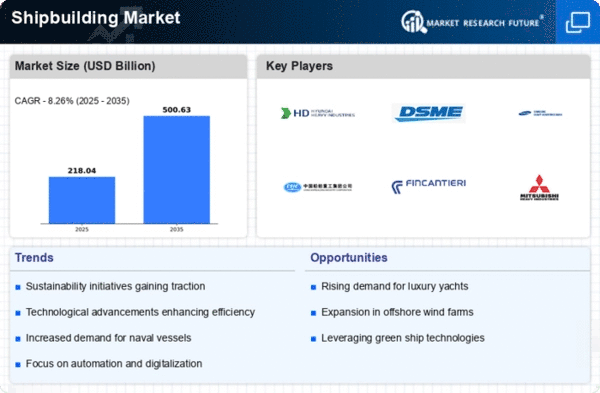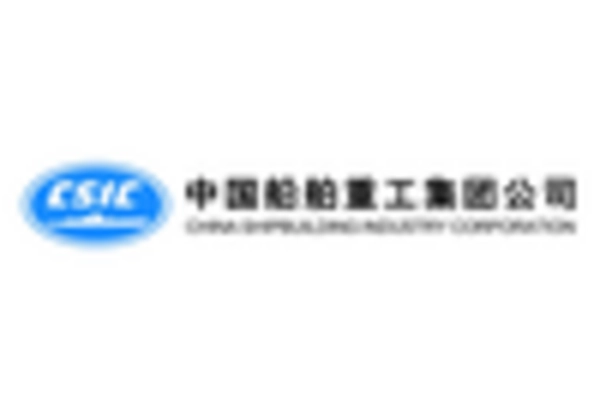Market Trends
Key Emerging Trends in the Shipbuilding Market
The Shipbuilding Market is undergoing transformative trends that are reshaping the industry, influencing vessel designs, construction techniques, and market dynamics.
One significant trend is the emphasis on technological advancements and digitalization within shipbuilding. Industry players are increasingly incorporating cutting-edge technologies such as automation, artificial intelligence, and digital twin simulations into vessel design, construction, and operations. Automation streamlines manufacturing processes, enhances precision, and reduces labor costs, leading to more efficient and cost-effective shipbuilding. Digital twin simulations enable shipbuilders to create virtual replicas of vessels, allowing for real-time monitoring, testing, and predictive maintenance, improving vessel performance and reliability.
Environmental sustainability is a key trend driving changes in the Shipbuilding Market. There's a growing focus on constructing eco-friendly and energy-efficient vessels that comply with stringent environmental regulations. Shipbuilders are adopting cleaner propulsion systems, integrating renewable energy sources, and incorporating technologies to reduce emissions, ballast water discharge, and fuel consumption. The industry's shift toward eco-friendly practices aligns with global efforts to mitigate maritime pollution and reduce the carbon footprint of shipping operations.
Another prominent trend is the evolution of vessel designs to cater to changing industry needs. Shipbuilders are developing vessels optimized for specific purposes and industries. There's a rising demand for specialized vessels for offshore industries like renewable energy, such as offshore wind farms and oil and gas exploration. Additionally, the growth of the cruise industry has led to a focus on constructing larger, more luxurious cruise ships with enhanced amenities and environmentally sustainable features, catering to evolving consumer preferences.
Digitalization and data-driven solutions are increasingly shaping shipbuilding operations. Shipbuilders are utilizing data analytics, IoT (Internet of Things), and connectivity to optimize vessel performance, maintenance, and operations. Real-time data collection and analysis enable predictive maintenance, enhancing vessel reliability and reducing downtime. Furthermore, the integration of smart technologies and connectivity within vessels enhances safety, navigation, and operational efficiency.
The adoption of modular and prefabricated construction techniques is gaining traction in the Shipbuilding Market. Shipbuilders are leveraging modular construction methods to improve efficiency, reduce construction time, and enhance cost-effectiveness. Prefabrication allows for the assembly of vessel components in controlled environments, optimizing quality control and minimizing construction delays, leading to faster vessel deliveries.
However, challenges persist amidst these trends. Cost management remains a significant challenge for shipbuilders embracing advanced technologies and eco-friendly designs. Innovations often come with higher production costs, impacting profitability and pricing competitiveness. Additionally, navigating regulatory complexities, ensuring compliance with evolving environmental standards, and addressing the skilled labor shortage in shipbuilding pose ongoing challenges for the industry.
In conclusion, the Shipbuilding Market is experiencing transformative trends driven by technological advancements, environmental sustainability, evolving vessel designs, digitalization, and innovative construction methods. Adapting to these trends requires shipbuilders to invest in innovation, sustainability, and digital technologies while addressing challenges such as cost management and regulatory compliance. Successful adoption of these trends positions shipbuilders to meet evolving industry demands, enhance operational efficiency, and drive sustainable growth in this dynamic and competitive market.


















Leave a Comment